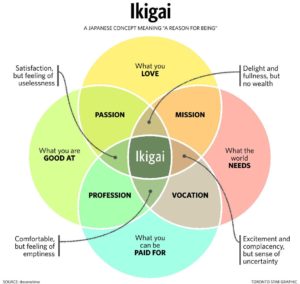Finding Your Ikigai
What does IKIGAI mean?
Ikigai is a Japanese term that means “the reason for being” or “the reason to live”. According to Japanese culture, all people have their Ikigai, a reason to get up every morning and be happy. Ikigai is about finding your life’s purpose. It is what keeps you motivated to plough through the day despite all the challenges you encounter.
Ikigai is a tool of self-discovery that allows you to reflect on four critical questions that can help us find our path.
- What do I love? (passion)
- What am I good at? (vocation)
- What can I be paid for? (profession)
- What does the world need? (mission)
Ikigai is seen as the convergence of these four elements. Discovering your ikigai is said to bring fulfilment, happiness, and make you live longer.
To discover your ikigai, you must first find what you’re most passionate about. After that, you find the means through which you can express that passion. Ikigai is about finding joy, fulfilment, and balance in life. It’s common to think that our job, family, passion, and desires are all separate and unrelated aspects of our lives.
The fundamental truth of ikigai is that everything is connected.
What does Ikigai have to do with teams?
Ikigai is not just a concept for individuals. It is vitally important for teams to building a shared vision and sense of purpose.
Without this shared vision, without clearly understanding the “why” and the “role of the team” in a transformation, we will continue to build this skyscraper taller and taller, despite its fragile foundation.
Without an Ikigai, teams will be utilizing a practice that isn’t anchored in shared values, a philosophy, or a way of understanding what we do and why. Teams risk moving forward when some team members aren’t even headed in the same direction.
Ikigai in the workplace
In this volatile and uncertain world, the ikigai framework can guide us to have alignment and clarity around the critical questions of: Why we do what we do? Where can we have the biggest impact? How can we achieve it? Who/What can help us?
When the team’s ikigai is aligned with the company’s vision, it would result in a high functioning team.








